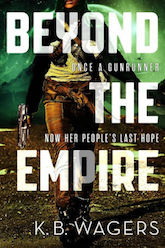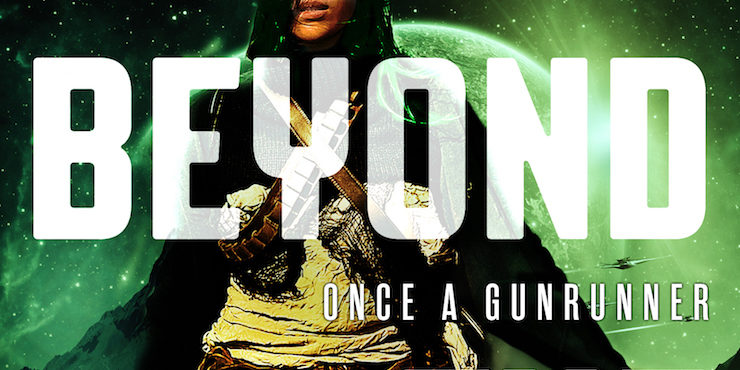Beyond the Empire in the third and final novel in K.B. Wagers’ Indranan War space opera trilogy, following After the Crown and Behind the Throne. It has high bar to clear, and a lot of explosive plot to wrap up. Will gunrunner empress Hail Bristol reclaim her throne, keep her protectors safe, and revenge herself on the enemy responsible for the assassinations of her father, sisters, and mother?
Behind the Throne introduced us to princess-turned-gunrunner Hail Bristol as she was—with impressive reluctance—being dragged home after twenty years to take the place of her assassinated sisters in the line of the succession to the matriarchal Indranan Empire. When her mother the empress dies, poisoned by a conspiracy, Hail steps up to the plate. She’s just inherited an empire threatened by war and internal dissent. She doesn’t know much about running an empire, but revenge and kicking ass? That’s within her skill set.
Buy the Book


Beyond the Empire (The Indranan War)
After the Crown heated things up, with Hail engaged in a shooting war with Indrana’s traditional Saxon enemies—while at home, a coup steals control of her capital planet and a large proportion of her military out from under her. In order to regain the upper hand, she makes deals with criminal overlords that she knows from her gunrunner days and plays a central role herself in a mission to regain control of several ships of the line. When Beyond the Empire opens, it’s with Hail marking time, trying to figure out how to make her next move in order to get as few people as possible killed.
I really enjoyed Behind the Throne and After the Crown, and I’ve been trying to put my finger on why Beyond the Empire feels less focused and less gripping in comparison. Part of it is the vast increase in the cast of characters over the course of the trilogy, and the time interval since I read After the Crown: it’s easy to forget who two or three people are in the absence of a dramatis personae list, especially when they all—like regular people—have more than one name that is used in different circumstances.
But part of it, too, is the difficulty of constructing an adventure-type spare opera narrative around an empress who has accepted her role as someone who cannot lead from the front except in exceptional circumstances. Adventure stories rely on the main character’s ability to take risks, and in Behind the Throne and After the Crown, Hail—as reluctant heir and then empress-on-the-run—had a lot more scope for personal ass-kicking. But in Beyond the Empire, her impulse to throw herself onto the front line has been tempered by an appreciation for her security team, several members of which have already died for her. She can’t stop caring for them and being hurt by their suffering on her behalf, and her risk-taking is now part of a constant and ongoing negotiation with her bodyguards. This changes the tone of Beyond the Empire in comparison to its predecessors. The emotional tension lies with the guilt Hail feels in putting people she cares about at risk—and the grief she feels when they are hurt or die—and her desire for success and vengeance. In some ways, this makes Beyond the Empire a much more emotionally nuanced work than a lot of swashbuckling space opera, but in other ways, the constraint that this imposes on Hail’s actions and emotional reactions makes the novel more static, and more claustrophobic, than its predecessors.
That’s not to say that Beyond the Empire doesn’t buckle its swashes and get down to some fine space opera action. There’s a space battle and at least one rooftop chase scene, surprising revelations about the villain, found family and deep friendship, and a visionary who can see glimpses of the future. Wagers excels at characterisation: the individuals who populate Beyond the Empire are believably human (though the villain does seem implausibly competent) and their relationships with each other feel understandable and true. The dialogue is great, and so are the action scenes, and if the pacing wobbles a little… well, wrapping up large-scale political space opera is tricky.
It’s an ambitious if not entirely successful conclusion to an exciting trilogy. I enjoyed it a lot, despite its occasional flaws, and I hope to see much more of K.B. Wagers’ work.
Beyond the Empire is available from Orbit Books.
Liz Bourke is a cranky queer person who reads books. She holds a Ph.D in Classics from Trinity College, Dublin. Her first book, Sleeping With Monsters, a collection of reviews and criticism, is out now from Aqueduct Press. Find her at her blog, where she’s been known to talk about even more books thanks to her Patreon supporters. Or find her at her Twitter. She supports the work of the Irish Refugee Council and the Abortion Rights Campaign.










